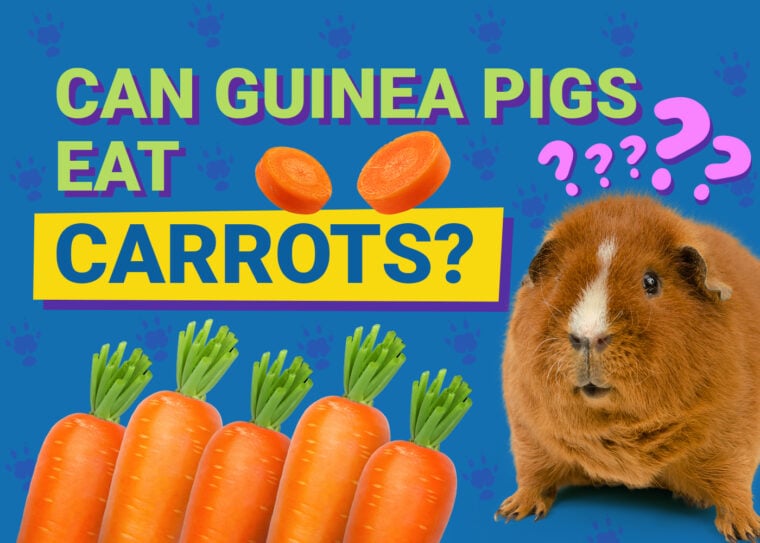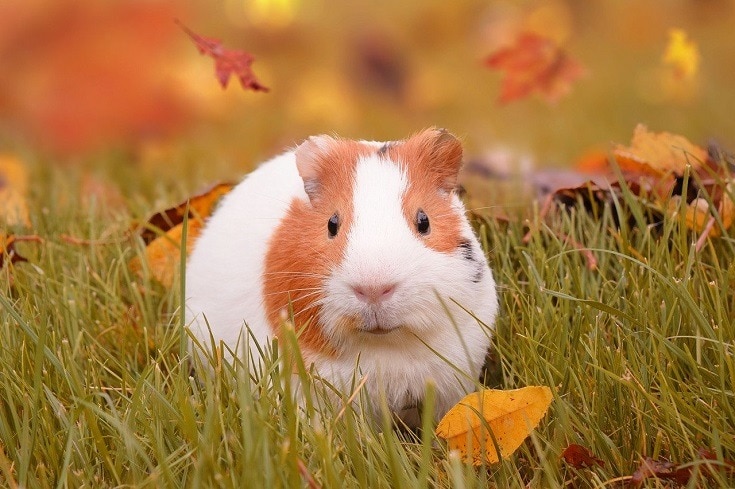
If you’re looking to supplement your guinea pig’s diet with fresh fruit and vegetables, you might be wondering if carrots are safe for your pig to eat. Carrots certainly taste delicious to most guinea pigs, and they can look extremely cute and happy while chomping on carrot slices. But are carrots something that you should be feeding your guinea pig regularly or even at all?
Before we dive into our in-depth information, know that yes, carrots are safe for your guinea pig to eat, as long as they’re given in moderation.
That said, you shouldn’t be feeding your guinea pig carrots if they’re overweight or suffer from diabetes or allergies.
Benefits of Feeding Carrots to Guinea Pigs
Carrots are packed full of beneficial vitamins and minerals that can help keep your guinea pig looking and feeling healthy.
Source: https://fdc.nal.usda.gov/fdc-app.html#/food-details/170393/nutrients
Vitamin C is of particular interest because guinea pigs cannot make this vitamin on their own and need it from their diet.

As guinea pigs can’t synthesize or create vitamin C within their own bodies, your guinea pig’s diet must contain sources rich in vitamin C. And of course, carrots are an excellent example of that!
Carrots are around 88% water, which means they’re useful in helping your guinea stay well hydrated.
Potential Downsides of Overfeeding Carrots
The main issue with feeding carrots to your guinea pig is that carrots contain a large amount of carbohydrates. Overconsumption of high amounts of carrots will likely result in a guinea pig that faces some issues with controlling their blood sugar levels, as the influx of carbohydrates, naturally occurring sugar, and starch can be somewhat detrimental in high amounts.
Like most fruits and vegetables, though carrots contain fiber, it usually isn’t in amounts that a guinea pig needs. Therefore, overconsumption of carrots can make your guinea pig feel full (because of their carbohydrate content) but deprive them of some much needed fiber (which they usually get from the hay and grass they eat). This usually results in a bloated and constipated guinea pig. For this reason, fruits and vegetables, while important, should only comprise a small portion of your guinea pig’s daily food intake.

How Many Carrots Can I Feed My Guinea Pig?
If you know your guinea pig has a soft spot for carrots, you might be wondering how many carrots you can safely feed your pig?
Carrots can be fed once a week as part of a larger ratio of fresh fruits and vegetables. They should be considered a supplementary item rather than a staple that you feed every day.
Remember to introduce any new food slowly to avoid the risk of your guinea developing diarrhea. If their poop changes consistency or they seem to behave differently than normal, remove the new food and check in with your veterinarian.
What About Carrot Tops?
Most guinea pigs love the green tops of carrots, so you can include these as well. Just make sure these aren’t fed more than any other part of the carrot plant.
Guinea Pig Diet
Now we know that carrots should be an occasional treat for your guinea pig, what else should their diet contain?
Guinea pigs are herbivores that do best on a pelleted diet made specifically for them, and an unlimited amount of high-quality hay. Examples of appropriate hay for guinea pigs include timothy, orchard, grass, and oat hay. Hay in conjunction with pellets should form the overwhelming bulk of their diet (approximately 80%–90%). In addition, they require a daily serving of fresh leafy vegetables. Guinea pigs should have access to fresh, clean drinking water at all times.
Suitable treats for guinea pigs include some fruits and grains, however, these should only comprise about 5%–10% of their daily intake on days when they’re offered, and should only be considered as treats, not a main part of their diet.
The reason why fresh vegetables are considered important for guinea pigs is because they lack the ability to make their own vitamin C, and require it in their diet. The vitamin C requirement of an adult guinea pig that isn’t breeding is around 10mg/kg/day (milligrams per kilogram per day).
Though many commercial guinea pig diets are fortified with vitamin C, it often deteriorates rapidly (especially if the pellets are stored improperly). The same rings true for vitamin C added to a guinea pig’s drinking water. Vegetables are therefore considered a great source of vitamin C, and have a healthier nutritional profile than most fruits (which is why they are preferred over fruits.
A small portion size for a guinea pig would be a cup of fresh fruits and vegetables. Within this blend, you can mix in around a quarter cup of carrots. Carrots should only be included around once a week. Suitable leafy greens should always make up the majority of your guinea’s portion of fruit and vegetables.

Wrapping It Up
Carrots are safe for your guinea pig to eat, as long as you feed them as an occasional treat rather than every day. Healthy green leafy vegetables should always make up the majority of your pig’s fruit and vegetable ration. But if your healthy guinea loves crunching on carrot sticks, then go ahead! Just make sure they know that it’s not an everyday occurrence.
- See Also: Can Guinea Pigs Eat Melon









